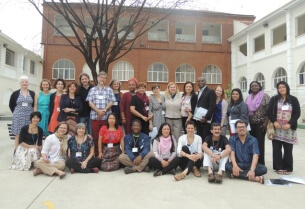At the first of a series of regional workshops of the Side by Side: Faith Movement for Gender Justice initiative, leaders representing Anglican Communion churches in Brazil, Mexico, Colombia, the Dominican Republic, Ecuador, Honduras, Puerto Rico, Uruguay and Venezuela joined representatives from national, regional and international faith communities and organisations in setting up a regional coordination group to implement the gathering’s strong commitments to overcoming gender inequality.
“It’s about restoring relationships to one of equality, where men and women are valued in the image of God. Gender justice means that all can flourish,” said Paulo Ueti, Anglican Alliance Facilitator for Latin America and the Caribbean (LAC), who supported the workshop in São Paulo, Brazil, from 26 to 28 October.
Side by Side brings together churches and Christian networks and agencies to explore the theological imperative for gender justice, and ways to take action together. The Anglican Communion Office, together with the Anglican Alliance, participated in the movement’s foundational meeting in March in London and the Revd Terrie Robinson, Director for Women in Church and Society at the Anglican Communion Office, is co-chair of the Side by Side’s inception committee.
“A top priority of Side by Side is to build the capacity of faith leaders to tackle gender inequality. The workshop was a key opportunity for clergy and lay leaders in the LAC region to discuss our particular contexts, potentialities and challenges for faith-led gender justice,” Paulo said.
The workshop’s theological reflection underlined the participants’ common understanding of the importance of confronting inequality and all kinds of discrimination, despite varying cultural, religious and linguistic backgrounds, he added.
In the passage in Luke (13,10-17) that the workshop studied, Jesus heals a woman with disability. “The central message debated is the prophetic and challenging message of Jesus, who reaches out to a woman who is considered the personification of exclusion, in defiance of the established interpretation of the rules of that time,” said Mara Luz of the Anglican Alliance Advisory Council and member of the newly-appointed Side by Side LAC coordination group.
This rejection of discriminatory societal norms carries a strong challenge in the LAC context where inequalities between different “identities” are not only an everyday reality but are also interdependent, Paulo commented. “The privilege of being white, male, urban, exists because a black, rural woman is structurally excluded.”
The participants identified further barriers preventing women and men in the region from enjoying their right to a life in dignity and freedom from violence, among them increasing political and religious conservatism, poverty, the absence of decent public services, widespread racism, erosion of previously acquired rights, and the lack of separation between state and religion. Another important issue raised was the tiredness with the issue of “gender”.
Participants greatly valued the workshop space to share experiences and learn from each other in the face of these barriers. They highlighted the theological, awareness raising, and advocacy work they are involved in to effect change and transform barriers, including support for vulnerable Haitian women in the Dominican Republic, theological reflection and formation from a woman’s perspective in Nicaragua, peace building and support for female survivors of violence in Colombia, and interfaith gender justice projects in Haiti.
For the Revd Elizabeth Cepeda from the Anglican Church of Mexico, who assists people who suffer tremendous violence as they attempt to cross the border with the United States, “the richness of this movement is precisely the possibility to be part of it, to share experiences and build empowerment in the different layers of social justice, and work to enable good practices and learn from the errors made before”.
Paulo said the workshop was helping to identify the specific resources the LAC region can bring to the global movement for gender justice.
“Liberation theology, interreligious and ecumenical work, new understandings of masculinity, popular Bible reading by women collectives, and Afro and Indigenous spiritualities all can enrich action that faith leaders in other regions take to transform gender inequality,” he said.
“The most important issue we discovered was the need to work interreligiously and inclusively: we need to seek out the common points, not our differences, always with respect,” the workshop participants affirmed together.
The Revd Rachel Carnegie, Anglican Alliance Co-Executive Director, underlined the importance of the Side by Side initiative.
“Gender justice is at the heart of the Alliance’s vision and it is exciting to see the energy in the region around this Alliance global priority,” she said. “Anglican partners in Latin America are indeed galvanised for action.”
Collaboration for such action is crucial and the Alliance, alongside other key actors in the Communion, will continue to support Anglican participation in this important global movement for gender justice, she added.
Photo: Side by Side LAC workshop participants

